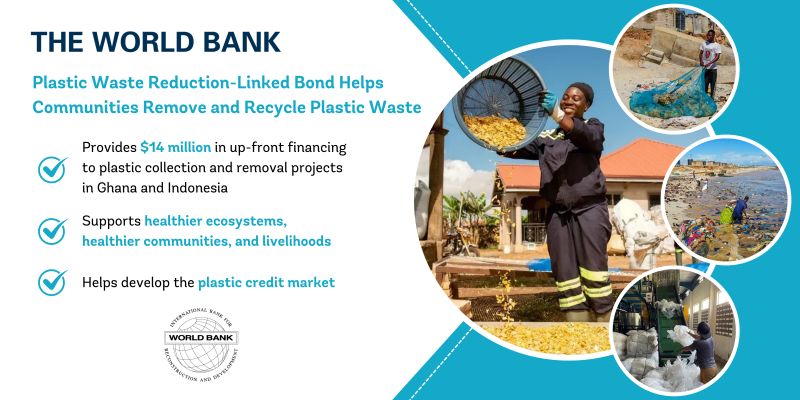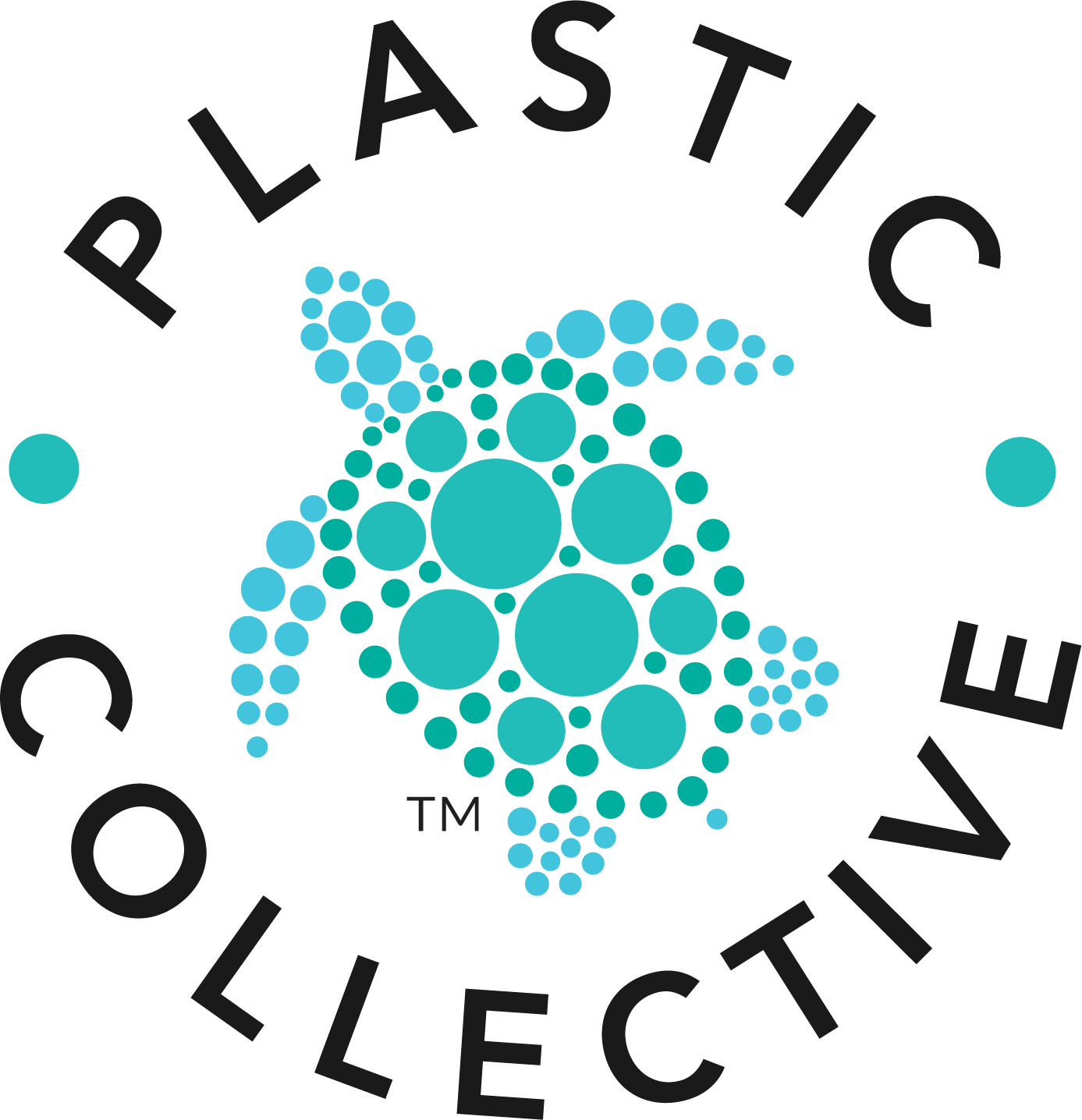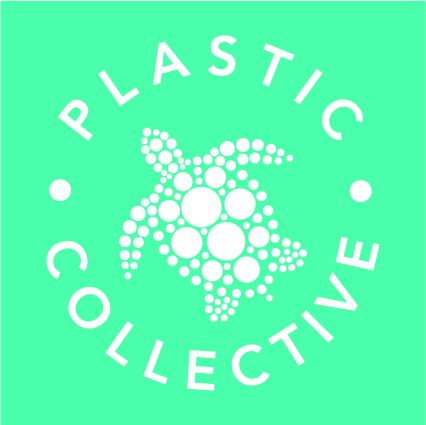WORLD BANK / FEATURE STORY: Tackling the Plastics Pollution Crisis by Channeling Private Capital to Projects that Reduce Plastic Waste

WORLD BANK/ FEATURE STORY: Washington, D.C., January 24, 2024
Of the nearly 350 million tons of plastics that are produced annually, about 70 percent end up in managed landfills or are incinerated, about 10 percent is recycled and the remaining 20 percent simply escape into the environment. According to the OECD, nearly 1.7 million tons of this plastic ends up in the oceans, and if evenly distributed, would create a wall of plastic waste that one would have to climb over to access the ocean the world over.
This plastic pollution degrades ecosystems and imperils human health and livelihoods. Unmanaged plastic pollution harms marine and terrestrial ecosystems and contaminates soil, fisheries, and livestock creating food insecurity. Ultimately, it’s the poorest and most vulnerable at the highest risk since they often live close to where plastics are routinely burned. They also tend to live in marginalized land that is subject to blocked waterways which lead to flooding with devastating consequences.
The World Bank is supporting its member countries in their efforts to address this problem, at every stage of the plastic lifecycle: from reducing single-use and problematic plastics to stopping leakages to the environment through improved solid waste management and enabling a circular economy. Governments enact laws and policies to enable the transition. The private sector has a key role to play in terms of finance, technology, and circular business models.
Private businesses such as formal recyclers and collection centers are positioned to be part of the solution. These are often powered through the support of informal waste collectors – also known as waste pickers– who account for many more self-created livelihoods in the waste sector. These people earn their income from collecting, sorting, and aggregating waste found in streets and landfills or sourced directly from households. They then sell recyclable waste, including plastic items, to buyback centers or formal recyclers. Financing for these small and medium-sized enterprises can be challenging, especially in developing countries where the challenges are most acute.
A new tool to measure plastic waste collection and recycling has been developed based on the concept of carbon credits: Plastic Waste Collection Credits and Plastic Waste Recycling Credits (collectively called “plastic credits”). Each plastic credit represents one ton of plastic that has either been collected or recycled. The funds from the sale of plastic credits to businesses that want to be part of the solution often aren’t available until the positive outcome is achieved, sometimes years after the initial investment – creating a significant and often insurmountable timing mismatch.
The new Plastic Waste Reduction-Linked Bond solves the timing mismatch problem by channeling up-front financing from capital market investors looking to support plastic waste collection and recycling activities, through a tradeable, high-grade investment product. Investors in the bond will earn a return that is partly linked to the issuance of plastic and carbon credits from two plastic waste and recycling projects, in Ghana and Indonesia. In Ghana, funds will support a community-based project to expand the number of waste collection and recycling sites in Accra and in Indonesia to scale efforts in Surabaya to reduce ocean-bound plastics.
An amount equal to a portion of the coupons that normally would be paid to Plastic Waste Reduction-Linked Bond investors by the World Bank (approx. $14 million) is front-loaded and paid in two installments to Plastic Collective by Citi. Plastic Collective in turn channels the financing to the projects in Ghana and Indonesia (FAQ for more details).
“This new bond is emblematic of the strong partnerships that are needed, particularly between investors, governments, financial institutions, and local delivery partners to achieve the Sustainable Development Goals (SDGs), including efforts to reduce plastics waste,” said Jorge Familiar, Vice President and Treasurer, World Bank.
The two plastic collection and recycling projects in Ghana and Indonesia over the next ten years are expected to collect approximately 230,000 tons of plastic waste out of which 180,000 tons will be recycled. They will support the production of a diverse range of recycled plastic products including electronics, luggage, and reusable bags. A portion of the funding will be used to install a food-grade recycling production line. In addition, the supported projects have important development co-benefits including direct and indirect employment for over a thousand individuals from the neighboring underserved communities, of which half are expected to be women. The projects provide staff and informal waste collectors with full personal protective equipment as well as health and safety training. In addition, the projects have climate co-benefits by reducing new plastic production.
“Plastic pollution wreaks havoc on developing countries by degrading ecosystems on which the wealth of the poor depends, further eroding the possibility for people to get out of poverty. It’s also entering the blue food chain and endangering fisheries, and the people who depend on fish for their nutrition. This innovative Plastic Waste Reduction-Linked Bond channels funds to finance to support the growth of small- and medium-sized enterprises that are on the frontlines of the plastic pollution challenge and poised to make a positive contribution for the environment, human health, and jobs in their communities,”
said Valerie Hickey, Global Director, Environment, Natural Resources and Blue Economy, World Bank.
“We’re both proud and excited to see this funding effort come to fruition. For almost a decade, Plastic Collective has been at the forefront of developing innovative and sustainable ways to fund plastic collection and recycling projects in the most disadvantaged communities around the world and to help provide finance to the normally unfinanceable. The funding will enable the expansion of facilities and production lines, plus the implementation of social welfare programs to enhance and protect the livelihood of informal waste pickers who are the foundation of these projects. We hope that this new approach to financing environmental and social impact activities benefits many more in the future,” said Steve Hardman, CEO, Plastic Collective.
Disclaimers:
Net proceeds of the bonds described herein are not committed or earmarked for lending to, or financing of, any particular World Bank projects or programs. Payments on the bonds are not funded by any particular World Bank project or program.
This publication is not an offer for sale of securities of the International Bank for Reconstruction and Development (“IBRD”), also known in the capital markets as “World Bank”. Any offering of World Bank securities will take place solely on the basis of the relevant offering documentation including, but not limited to, the prospectus, term sheet and/or final terms, as applicable, prepared by the World Bank or on behalf of the World Bank, and is subject to restrictions under the laws of several countries. World Bank securities may not be offered or sold except in compliance with all such laws. The World Bank Sustainable Development Bond Framework, the World Bank’s Sustainable Development Bond Impact Report, and the information set forth therein are not a part of, or incorporated by reference into, the offering documentation.
This publication contains or references links to websites operated by third parties (“Third Party Websites”). These links are provided for information purposes only. Third Party Websites are not under control of the World Bank. The World Bank is not responsible for the content of, or links contained in, any Third Party Website, and the inclusion of such links does not imply that The World Bank endorses, recommends, or accepts any responsibility for the content of such Third Party Website.
Related Articles
- World Bank/ Press Release: Plastic Waste Reduction-Linked Bond
- World Bank Plastic Waste Reduction-Linked Bond – FAQ
- Plastic Collective Press Release: Plastic Collective attracts landmark fundraising to tackle plastic pollution
- Verra News: Plastic Credits to Be Leveraged by Groundbreaking Outcome Bond

